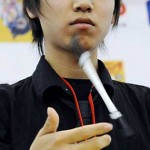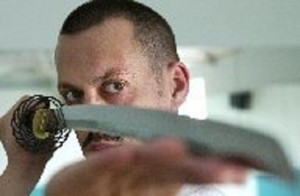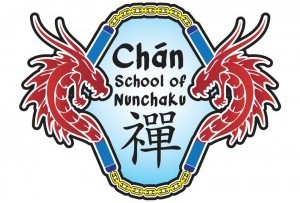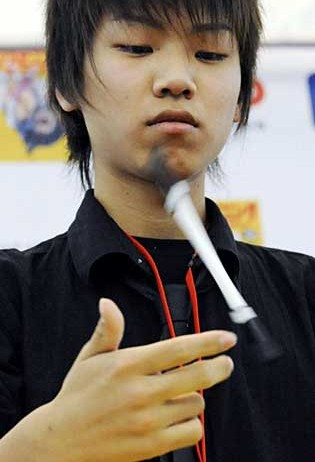Poor Form – Poor Kobudo
It is often said that for an accomplished martial artist, the weapon becomes an extension of his own techniques. If a martial artist has poor form, this will show in his kobudo. That much is true but, in reality, we must first become an extension of the weapon before we can effectively project it as an extension of our technique. That means sensitivity training.
 Weighing Up
Weighing Up
Who has not picked up a pen and tossed it in the air only to catch it moments later after it has spun once or twice? If you haven’t done this yourself, you will have witnessed somebody else doing it or even been disturbed at a public gathering when somebody else has dropped the pen they were playing with. What are they actually doing there? Well, firstly they have to weigh up the pen; that means assessing its weight and weight distribution. From there, they get an idea of how much force will be required to throw it up in the air, and they can estimate how much turning force is required to make it spin in the air. They don’t work that out in a lecture theatre or with a pen and paper. The maths would be horrendous, I am sure, but the human mind and body working in harmony together can just intuit such things in a blink of an eye.
Use Your Genius
This inherent genius that we all possess comes to the fore when we relax, still the mind, and observe. Time can almost slow down. We do it all the time, almost without thinking; when we throw something into the bin, catch an objective, run across the road when we shouldn’t have and dodge all the traffic. Yet, when it comes to learning a martial art, and particularly with weapons handling, people become dictatorial, forgetting the weighing up of the object at hand, forgetting to feel how it needs to move, forgetting to take into account its nature.
 Feel First – Then Act
Feel First – Then Act
There are a whole range of ways to increase sensitivity. A very useful tool for learning how to still the mind, making it more sensitive, is meditation. One of my favourites is Zazen meditation or ‘Chan’ meditation. This form of meditation, brings the person to the present moment and no effort is made to push away thought or replace thought and distraction with pleasantries. The whole practice of Chan meditation is to see what goes on within the mind as it is and, more importantly, to realise that the real self is NOT the thoughts, sights and sounds that fill the mind. By watching thoughts and feelings as they arise, we tap into something within our core, something that is very still, calm and sensitive. It is this that we need to find and to bring to the table as martial artists – whether when practicing kobudo, fighting or relaxing.
Sensitivity Training
Within the Kung Fu tradition they practice something called Push Hands or Sticky Hands where students face each other, keeping their hands in light contact, and trying to read each others’ intentions by feeling the changes in force in the opponent’s touch. Wing Tsun practitioners have their own training exercise called Chi Sau which works on the same principle. For anybody wanting to master the movements of nunchaku, I would recommend they start by holding a pair by one baton, and allowing the free baton to swing slowly. Gradually allow the arm to swing in harmony with the baton so the free baton becomes an extension of the swinging arm and the two move together. Once this has been achieved, you can experiment by making the swing wider or narrower and then watch how long the free baton stays still on the furthest point of its swing, before it changes direction. This is a great exercise for weighing up a pair of nunchaku before practice and I recommend it to students of all levels, particularly when they are using a pair of nunchaku they have not used before.
Take It Everywhere
Remember, above all, that the principles of feeling and sensitivity are universal and can be applied to any relationship whether at home or in work, with clients or with customers. When we feel the wants and needs of others, we may not relate to those feelings, but at least we are better prepared for dealing with their concerns as well as ours.
The Chan School of Nunchaku is always happy to help students in all aspects of nunchaku training.


 Follow
Follow